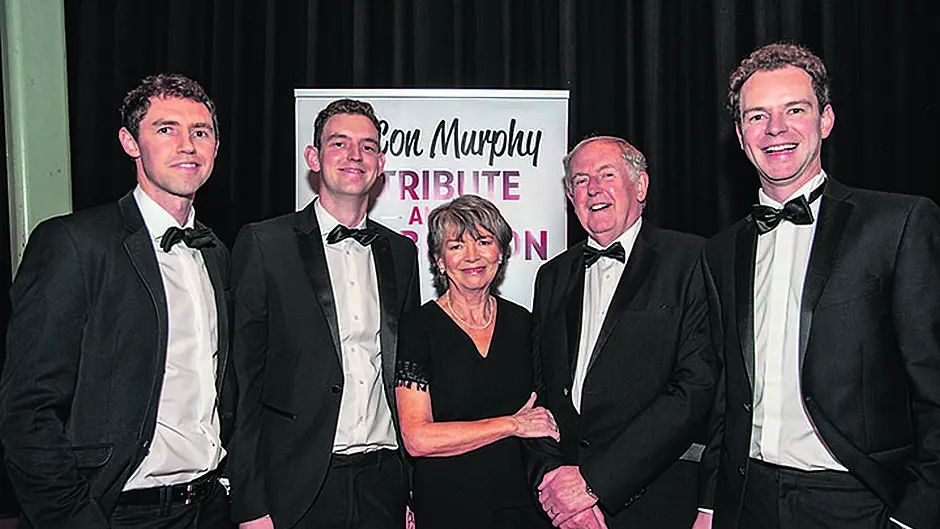Amazing contribution to several Cork teams over the past 43 years
Amazing contribution to several Cork teams over the past 43 years
BY TOM LYONS
WHEN the newly set-up Cairde Chorcaí, Cork Supporters GAA Club, decided to run an event that would unite all Cork GAA people and sports lovers in Cork, they needed a central character to honour who would transcend all the differences we often see in Cork sport.
They didn’t have far to look, because in their midst, they had a living legend of Cork GAA who is revered far and wide for the amazing contribution he has made during the past 43 years.
Dr Con Murphy never kicked a football or hit a sliotar for any Cork team but he has rubbed shoulders with all the greats of Cork GAA during the past 43 years and has contributed more than any player with numerous All-Ireland medals to their names. As team doctor to Cork hurlers and footballers for 43 years, he has seen it all, done it all, been there, shared in the glory and despaired at the lows.
Yet, he has remained the same humble man who was first roped in to help the Cork hurlers in 1976 when no medical person was available for a game early in the year. When Billy Morgan heard he was helping the hurlers, he approached him to get involved with the footballers too, as Murphy’s family, from Beara, was always a football family, his famous father ‘Weesh,’ former chairman of the Cork County Board, winning an All-Ireland football medal with Cork in 1945.
Murphy’s earliest connection to the Cork football team came when he was only 10 years of age and he was mascot to the Cork team that lost the 1956 All-Ireland final to Galway. It was the first time he ever saw grown men cry.
By the age of 14 he admitted he was never going to play with Cork but when his club, Lees, went out of existence in 1967, he was a student in UCC at the time and joined the college club.
He has remained a member of the UCC club ever since and has acted as medical officer and selector with them for more years than he cares to remember, putting generations of future Cork players through his hands.
It was all so different when Murphy joined the Cork teams back in 1976. In those years, he was the sole medical person with the team; no physios, no strength and conditioning coaches, no psychologists. He was the man who treated all injuries on the pitch but, strangely, he remembers how rare on-field injuries were in those days.
‘In the old days I rarely had to venture on to the pitch, there never seemed any need to. I was into my eighth match before I was called on by a referee and I remember when Cork won the double in 1990, I never once went onto the pitch in Croke Park. Now teams are actually using medical breaks as tactics to stop games or something. It’s all changed.’
Murphy now has two assistants to help him at matches, including his own son, but being the only medical person in the Cork camp for many years, he built up a special relationship with the players. Down the years he became more of a father-figure to the players than just the team doctor.
In his own clinic, his patients dreaded seeing any Cork players coming in as Murphy would spend ages talking hurling and football to them while the patients waited! It wasn’t just the injury that Murphy treated but the player himself.
His affinity to the players and his loyalty to the County Board was really put to the test when the Cork players went on a series of strikes during the Noughties. A person in Murphy’s position could easily have sat on the fence, but that was not his way and he worked away quietly behind the scenes, on both sides to heal that disastrous rift.
He was one of the few to come through it with his reputation intact and nobody was more thrilled than Murphy himself at the recent tribute night to see the antagonists in those struggles coming together again for the good of Cork GAA. He looked on his tribute night not as a tribute to himself, but as a chance to heal the lingering ills from those bygone dark days. He was, after all, a healing man all his life with Cork teams.
A quiet man and a private man, Murphy has strong views on the present position of the GAA and where the association is heading. The pity is that men like Murphy, right at the heart of the association, aren’t listened to by the powers-that-be when change is called for.
‘It’s a whole new world now in Gaelic games,’ said Murphy, a little ruefully, when we interviewed him early last year. ‘We have more done already this season in training than we did in the whole season of 1976, when we won the hurling. Back then it was a few weeks training for the league, then a break and a couple of weeks to the championship.
‘The sacrifice players have to make now at intercounty level is unreal, far too much. The idea of playing just for enjoyment is gone; now it’s all about winning and it’s all far too serious. It’s hard to see where it will all end up. I can’t see the game becoming professional because that would destroy the whole ethos of the Association.’
As a man who deals with player injury and burn-out every day of the week, especially the pressure on third-level college players, Murphy should be listened to, but instead he is forced to try to pick up the pieces when the damage is done. He certainly has never shirked that responsibility, but must be saddened by the number of fine players he has seen retiring in recent years due to serious injury.
Murphy is not happy either with the new football championship that finished with a Super 8 competition, as he sees it as the rich getting richer while the poor get poorer in football terms.
‘The football in particular is bringing elitism into the game and that is a road we should never go down,’ said Murphy. ‘The top teams will get stronger and the lesser counties will get weaker. Under the new Super 8 system, I can never see a weak county ever again winning the All-Ireland by surprising the big guns; it just won’t happen.
‘If the whole system needs changing, why didn’t they look at the provincial system, that’s where the real change is needed. How can you equate the Ulster championship with the Munster championship?
‘Now, as regards the hurling, maybe the new league might work as all the teams in Munster are so evenly-balanced. But it’s the clubs and the club players who will really suffer in the long run and that is wrong.’
In his 43 years with Cork teams, Murphy has seen many highs and lows. He started on a high with Cork hurlers winning three in a row from 1976 to 1978 and was also delighted to share in Billy Morgan’s football triumphs in the late 1980s and early 1990s, especially the double in 1990. What were the high spots he remembered most during all those years?
‘It’s hard to pick out one over the other, but I think the football in 2010 takes top spot,’ said Murphy, showing his football roots. ‘That team had suffered a lot of pain, taken some hammerings from Kerry in Croke Park, but they were a super group of lads and never gave up the dream. They certainly deserved to win one, but it was so close in the final.
‘Then you had the three-in-a-row in the hurling in the late seventies, the double in 1990 and the hurling in 1999 with such a young team. They were all great days, but I suppose, overall, there were more downs than ups.’
Despite the present famine as regards winning All-Ireland titles, one football title in twenty years and no hurling since 2005, Murphy is very optimistic about the future of the Cork teams, teams he is still vitally involved with. ‘I think, in the next few years, we’ll definitely win the hurling,’ said an optimistic Murphy. ‘It might take a bit longer in the football, but we won’t go away.’
Certainly, looking at Dr Con Murphy surrounded by generations of Cork footballers and hurlers, lady footballers, camogie players, County Board officials, soccer and rugby personalities and dignitaries of Church and State at his tribute night, he won’t be going away anytime soon and his unifying presence is exactly what Cork GAA needs at the moment.
A job well done by Cairde Chorcaí in their first big public event.









